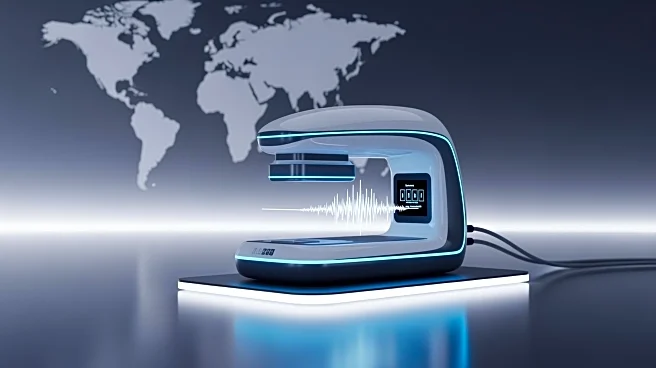What's Happening?
HistoSonics, a company specializing in non-invasive ultrasound therapy, has raised $250 million to support the commercial expansion of its Edison Histotripsy System. This funding round, led by the company's
new ownership group and including investors such as Thiel Bio and Founders Fund, aims to accelerate the global access to HistoSonics' platform. The Edison system uses focused ultrasound energy to liquefy and destroy tumors and tissue under real-time image guidance, offering a less invasive alternative to traditional procedures. The company plans to expand its focus from liver tumors to include kidney, pancreas, and prostate indications, aiming to establish histotripsy as a treatment option for a wide range of clinical applications.
Why It's Important?
The expansion of HistoSonics' Edison system represents a significant advancement in medical technology, potentially transforming the treatment of solid tumors and other diseases. By offering a non-invasive approach, the system could reduce the need for traditional surgical procedures, thereby minimizing patient suffering and improving quality of life. The funding positions HistoSonics to enhance its strategic priorities and expand its market presence, particularly in the U.S. and select global markets. This development could lead to broader insurance coverage and increased accessibility for patients, impacting the healthcare industry by introducing a new modality of care.
What's Next?
HistoSonics plans to continue its commercial expansion, focusing on securing market access in additional regions and expanding the clinical applications of its Edison system. The company aims to establish histotripsy as a standard treatment option for both benign and malignant conditions across various organs. As the system gains traction, it may prompt healthcare providers and insurers to reconsider treatment protocols and coverage options, potentially leading to wider adoption of non-invasive therapies. Stakeholders in the medical field will likely monitor the system's performance and outcomes closely, influencing future investment and development in similar technologies.
Beyond the Headlines
The introduction of histotripsy as a non-invasive treatment option could have ethical implications, particularly in terms of patient consent and the balance between innovative treatments and traditional care methods. As the technology evolves, it may challenge existing medical practices and prompt discussions about the role of technology in healthcare. Additionally, the expansion of such treatments could lead to shifts in healthcare policy and regulation, as authorities assess the safety and efficacy of new medical technologies.











